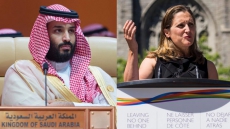VICTORIA — The results of British Columbia's referendum on whether the province should switch to a system of proportional representation are being released today.
In its last update on Dec. 7 as the voting was coming to a close, Elections BC said it had received 41 per cent of eligible ballots, which asked voters whether they would prefer to keep the existing first-past-the-post system or move to a form of proportional representation.
This is the third time voters in British Columbia have been asked if they want to make a change to the voting system.
In 2005, about 57 per cent of ballots were cast in favour of proportional representation, which did not meet the threshold of 60 per cent to make it binding on the government.
Four years later, 61 per cent voted in favour of first past the post.
The latest referendum is binding and the winner will be declared by a simple majority of votes cast.
In addition to asking voters which system they support, the ballot also included a second question that allowed voters to rank their preference for three types of proportional representation.
The three forms of proportional representation were mixed member proportional, rural-urban proportional and dual member proportional.
The Elections BC website says mixed member proportional is used in a number of countries, including Germany and New Zealand, and would see the election of two types of representatives, a district member and a regional member to the legislature. District legislative members would be elected using the first-past-the-post system while regional members would be elected from a party list so that each party's share of seats matches its share of the provincewide popular vote.
Dual member proportional would see all but the largest rural districts combined so each has two members. Parties running candidates for both seats would list their candidates as either first or second. The first candidate of the party with the most votes in the district would win the first seat and the second seat would be won by a party based on its share of the popular vote provincewide and in the district.
Rural-urban proportional combines two different voting systems, the single transferable vote and mixed member proportional systems with voters in urban and semi-urban districts using the single transferable vote to elect multiple members for their larger electoral district. In rural districts, voters would use the mixed member system to elect district and regional representatives.
Elections BC says provincial results in the rural-urban system are likely to be generally proportional, although it is not used by any other jurisdiction.
Other provinces, including Prince Edward Island and Ontario, have also held referendums on their electoral systems but neither made any changes.
In Prince Edward Island in 2016, the Liberal government decided not to honour a provincial plebiscite on electoral reform, in which only 36 per cent of eligible voters took part. Premier Wade MacLauchlan said it was debatable whether the result reflected the will of Islanders, and announced another vote will be held during the 2019 provincial election.


